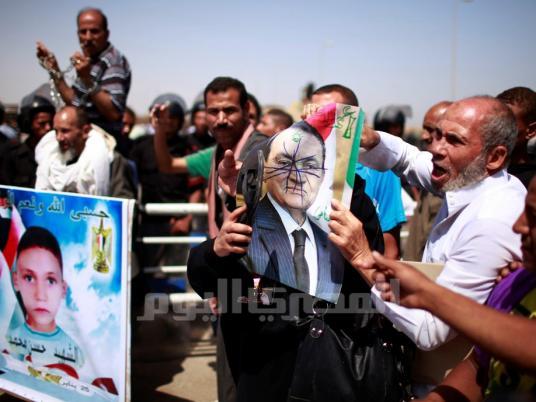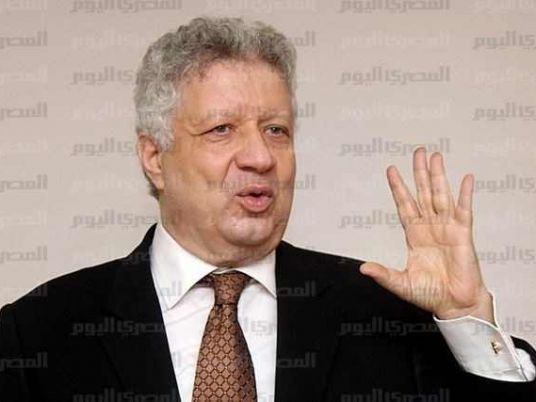
Marches are being staged nationwide in protest of the verdict handed out by a Cairo court today in the case against former President Hosni Mubarak and ten other defendants accused of killing protesters and squandering funds.
Mubarak received a life sentence alongside his Minister of Interior Habib al-Adly. All other defendants were acquitted.
Over 500 activists and martyrs’ relatives in Alexandria protested on the stairs of the High Court in al-Mansheya district against the sentence. A march headed to Al-Qaed Ibrahim Square, blocking the Corniche Road and preventing cars from passing.
The protesters chanted: "We don't want much talk, we want a death sentence," "Trial, trial, the same gang still rules," "Oh general prosecutor, for how much have you sold the blood of martyrs?" and "Death sentence to Hosni Mubarak."
The protesters expressed their dissatisfaction with the ruling saying it was not enough due to the heinous crimes the defendants committed against protesters.
Many across the country said only a death sentence would have been sufficient.
In Aswan, hundreds of members of the Revolutionary Youth Coalition, political parties, Kefaya and April 6 Youth Movement, staged marches to condemn the verdict, which found most of the Ministry of Interior officials, top aides of Adly, innocent.
They called for reviving the revolution, holding revolutionary trials of Mubarak and icons of his regime and purging the judiciary of corruption.
Wael Refaat, a lawyer and media spokesperson for the Coalition of Revolution Youth, criticized the exoneration of Mubarak’s sons and Adly’s aides and said the ruling opens the door for the exoneration of Mubarak and Adly if their sentences are appealed.
The presiding judge's introduction, he said, gave the impression that he was going to sentence the defendants to death.
Al-Rouby Gomaa, a rights activist and the head of Lawyers against Corruption Movement, described declaring Adly’s assistants innocent as unfair, saying Adly’s aides are only his followers Adly who responded to his orders to kill protesters and damage important evidence, abusing their positions.
Mostafa Mandour, secretary for Salafi-oriented Assala Party in Aswan, said, “The people are dissatisfied with the light sentences. The people are capable of returning to the streets.”
In Daqahliya, in the Delta of Egypt, hundreds of revolution youth, and members from Hazemoun Movement, Haqqi, 8th April officers, Emsek Feloul, April 6th Youth movements, protested in the Shuhada Square in front of the Daqahliya governorate headquarters against the Mubarak trial verdicts.
The protesters toured several streets in Mansoura.
The protesters chanted, “We want retribution, they killed our brothers,” and “In the name of God, we came to say to the oppressor ‘No’,” and carried hanged dummies of Mubarak and Adly.
In a statement, the protesters said the rulings “do not meet expectations”, and added that Mubarak and Adly would be exonerated if they appealed the verdict since Adly and his assistants were declared innocent.
In Suez, one of the first places to erupt in the January 2011 uprising and to offer martyrs, protesters took to the landmark Arbaeen Square to express the verdict rejection. They chanted, "Oh martyr, sleep and relax, and we shall continue to resist." They also shouted, "Execution, execution!"
Sayed Raafat al-Abed, member of the Freedom and Justice Party in Suez said that the ruling "does not conform to the amount of blood split in all Egypt's squares and all the wounded who incurred serious injuries during the uprising."
Similarly, Talaat Khalil, secretary general of Ghad al-Thawra Party in Suez, said, "The preamble presented by Judge Ahmad Refaat is an accusation of the whole Mubarak era, as if it was a revolutionary court. But when he moved to pronouncing the verdict in the case, he simply accused the prosecution for not giving him enough evidence."
Ali al-Geneidy, whose son Islam was killed in Suez during the uprising by gunfire, said he had expected Adly's execution, but was surprised to find all his aides who gave orders to central security officers to shoot protesters acquitted.
He called it "a planned scenario which is complemented by the acquittal of a lot of policemen in other cases raised for the killing of protesters."
There are 26 other cases heard in different courts in Egypt where policemen are accused of killing protesters during the 25 January uprising.
Meanwhile, Ultras Ahlawy called on people to take to the streets following the issuing of the verdict.
On Facebook, the statement described the verdict as “the final scene in the farce” that signals the return of the suppressive regime and called on people to revive the revolution.
“Simply, if the dream of the revolution is still alive within you, or if this country means anything to you …whether you are into politics or not, you should be out on the street, with the revolutionaries,” the message read.
Edited translations from Al-Masry Al-Youm


